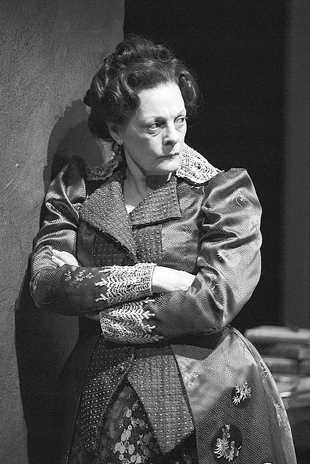Times have changed, but the truth has not
Prostitution, it seems, is just the thing on stage this season. Following closely on the heels of “The Little Dog Laughed,” Douglas Carter Beane’s brilliant satire of Hollywood that suggests our level of success is in part influenced by the level to which we will prostitute ourselves, “Mrs. Warren’s Profession” at the Irish Repertory suggests that morality takes a backseat to financial gain among not only men, but also among women; even if their career choices are limited. Though more than a century separates the two plays, it’s reassuring in a decidedly eerie way to recognize that the human capacity for hypocrisy in the service of personal gain remains a constant.
While Beane’s play tracks the dissolution of the souls of people who chose to prostitute themselves, George Bernard Shaw writes of a society that literally forces women into being sex workers. In his own commentary in the opening to “Plays Unpleasant,” a collection of his early work, he wrote, “‘Mrs. Warren’s Profession’ was written to draw attention to the truth that prostitution is caused, not by female depravity and male licentiousness, but simply by underpaying, undervaluing, and overworking women so shamefully that the poorest of them are forced to resort to prostitution. No normal woman would be a professional prostitute if she could better herself by being respectable, nor marry for money if she could afford to marry for love.”
The Mrs. Warren Shaw presents is a women who has drawn on what resources she had, and has structured her morality to suit the situation. Aided and abetted, and significantly funding, the men who have set her up in her business, Mrs. Warren has saved herself from destitution and obvious degradation and has provided for her daughter, Vivie, an education and the ability to move into and among the upper classes. And in the upper classes, we look down on prostitutes.
Vivie, who has never wanted for material comfort, has the luxury of criticizing and rejecting her mother after 20-some years. Yet at the end of the play, when Vivie has cut herself off from her mother’s wealth, she also cuts herself off from the man whom she loves but who has relied upon that wealth, and Vivie is about to find what it’s like to try to make it as a woman alone in this male-dominated world.
Shaw’s multi-layered plot exposes the greed and amorality that runs beneath the veneer of respectability. The lord is a pander and a profiteer. The reverend is not so moralistic that he has not had his dalliances with Mrs. Warren in the past. Shaw is no kinder to the kindly Mr. Praed, who, though charming, is seen as ineffectual and emasculated for being clueless about the real way the world works. Among the tea comforts and the country weekends, corruption of all sorts is pervasive. It is, Shaw suggests, the way of the world.
Dark though the subject matter is—and truer than most would want to admit—Charlotte Moore has directed a precise and fascinating production that deftly balances Shaw’s drawing room comedy styling and biting social commentary. Even in the dark, talky second act, Moore keeps the play buoyant and energetic, which Shaw seems to intend in the script, so that the horror of the situations of all the characters can be more fully felt.
Central to this production is Dana Ivey as Mrs. Warren. She delivers a passionate and focused performance that easily covers the full range of the character. Ivey, who has been known to fill much larger theaters with ease, scales her portrayal perfectly to the intimate stage of the Irish Rep, and Mrs. Warren becomes more poignant and disturbing as a result of this very intimacy.
Laura Odeh as Vivie is charming in a very unsympathetic role. She manages to balance Shaw’s use of Vivie as a literary device with humanity that underscores the tragedy of the character—and the society in which she lives. Kevin Collins is fine as Frank Gardner, Vivie’s young and vacuous suitor. Kenneth Garner is appropriately brittle and neurotic as the Reverend Samuel Gardner, and David Staller is excellent as Mr. Praed, a man who is a dear but really needs to figure out what’s going on around him. Sam Tsoutsouvas is equally strong as Sir George Crofts. Sir George is written to represent the world of men as it oppresses women, but Tsoutsouvas, finds the man—not a very nice man—beneath the polemic, which is one of the essential elements of successfully acting Shaw on the stage.
Today, when the world is more as Beane portrays it than as Shaw does, it’s hard to imagine that “Mrs. Warren’s Profession” was banned and early productions were greeted with arrests and closings. People were shocked that Shaw would support breaking society’s rules and even argue for prostitution as a necessary evil. Clearly, the rules have changed. The essential truths he was writing about, though, have not. Looks like we’re in for more prostitution.
gaycitynews.com



































